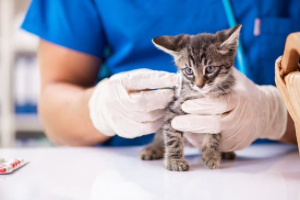
A new kitten is one of the best yet most unpredictable additions to a household. It’s an exciting time for families to be bringing in a new pet, but it can also be a lot to get used to. We often get many questions about parasite prevention, so we’ve put together this blog post for you to refer to as and when you need. We’ve included our top tips and considerations for parasite prevention for new kitten owners to help lessen the stress of having a new pet.
Kittens are extremely susceptible to parasitic infections:
While parasite prevention is important in pets of all ages, kittens are particularly susceptible to contracting parasites. They can be infected in the uterus directly from their mother with parasites such as roundworms, and they also spend lots of time accidentally getting faecal material from other animals in their mouths. This might be in their pen, at the rescue, or outdoors, among other places.
A large proportion of kittens (even from the best circumstances) have roundworms at birth and should be regularly wormed.

There is not one magical wormer that treats all intestinal parasites:
Check with a vet about which product is right for your kitten. Common wormers will typically cover roundworms and hookworms +/- tapeworms, but won’t cover other intestinal parasites such as coccidia or giardia. Having the vet check a faecal sample in your kitten is also smart to help identify any specific parasites present. This allows targeted and appropriate worming to be done.
Most products intended for regular use such as monthly or quarterly worming come as flavored chewable tablets, making it easier for you to administer and more enjoyable for your kitten to take. Powdered formulations to mix in food and spot on wormers are also available.
External parasites like fleas don’t discriminate against kittens:
Picking an appropriate flea/tick preventative is also on the docket for your kitten. Fleas and ticks are not only irritating, but carry a large range of diseases that can affect you and your kitten. Young kittens can become so severely infested with fleas they can become anemic (low red blood cell count). Most flea treatments are safe for use over 8 weeks of age, but be sure to check the product label as there are variations. The majority of these preventatives are made to be given once per month.
Again, we have to remember that not all products are created equal.
This means that some products come as spot on/topical liquids, some can be oral flavored chewable tablets, and many of them differ in coverage. Checking the product label will tell you which parasites are covered by the drug, and if you ever are unsure, asking your vet will help pick the best product for your pet.

Take home points for parasite prevention:
- Regular parasite prevention is essential for a healthy kitten, and often requires a combination of two products to achieve the desired broad spectrum protection.
- Be sure you talk to a vet about what your kitten is at risk for to pick the best option for their lifestyle and surrounding risks.
- Indoor only cats are at risk for fewer types of parasites than indoor/outdoor cats, but should still be treated.
To read more on parasite specifics, check out our blogs on worms, fleas, and ticks.
Dr. Kirsten Ronngren, DVM MRCVS
Ready to kickstart your pet’s parasite prevention journey? Get started here

